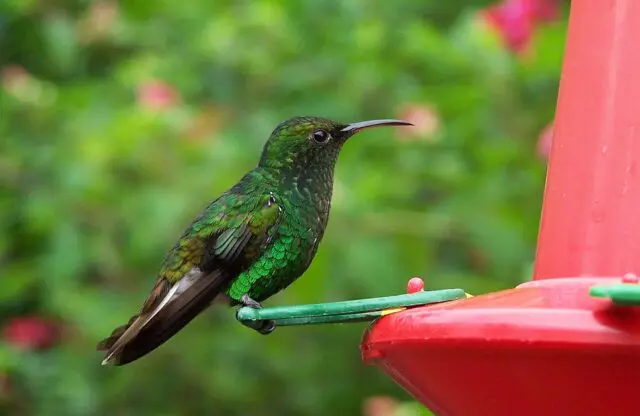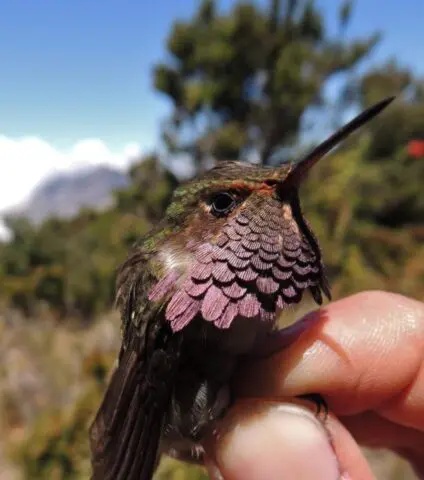Costa Rica has a significant wealth of diverse flora and fauna, one that is part of an immense biodiversity, which has caught not only the eyes, but the feeling of returning again and again for so many people in the world.This is what happens when someone observes species like the hummingbird, which, being one of the smallest, manages to captivate in a very special way.
Recently, the nature of the hummingbird and its impact in Costa Rica was recognized through a documentary called “The Hummingbird Effect”, made by the Brazilian cameraman and Emmy Award winner, Filipe De Andrade.

The documentary was recorded in the Central American country
DeAndrade, who has worked for many years with National Geographic, uploaded his work to the YouTube platform to be enjoyed free streaming until May 10th, today it costs $3.
It should be noted that the film also shows images of the incredible tropical forests of Costa Rica, in which a large number of powerful birds such as the hummingbird come to life.
Cameraman De Andrade said that “the hummingbird brought him to Costa Rica for the first time and he decided to make a documentary made over seven years.” In his trek around the country, he completely fell in love with other species of fauna such as the jaguar, the sea turtle, whales, dolphins, sharks, and the country in general.
More details of the documentary
The nature-loving public will also be able to appreciate in “The Hummingbird Effect”, scenes never before shown, referring to the nesting and feeding of the white-tipped sicklebill hummingbird, incorporating the quetzal and the mangrove hummingbird, considered in danger of extinction.
The documentary is the greatest example of the splendor and importance of the ecosystems of Costa Rica and the need to protect them. Leave as a reflection, that in the country more planting of native flowers in gardens and open spaces should be encouraged instead of using feeding stations since it is the best way to provide food and habitat for hummingbirds.
Very important, and it is that after the success that “The Hummingbird Effect” has had, De Andrade and his business partner Brian Moghari keep working on their next project, a documentary about jaguars in Costa Rica.
Costa Rica hummingbird territory
Costa Rica is a tropical country considered by many as a paradise for hummingbirds, since experts have assured that more than 50 species have been enjoyed here.
Flowers with nectar are usually their only food, which makes the hummingbird very similar to bees. Among the most preferred flowers for wonderful birds are: Exotic heliconias, attractive flowers due to their characteristics, that is, bright colors, because hummingbirds do not have a good sense of smell.

When feeding on the nectar of flowers, hummingbirds impregnate their beaks or heads with pollen. In their continuous visits from flower to flower, they transfer it and contribute to the pollination of the plants they visit.Hummingbirds also like to eat insects and small spiders, but nectar is their preferred food.
Maybe you didn’t know
Due to their instinct to seek and defend food, Hummingbirds are grouped into two large groups: those with straight bills and very territorialists and those with curved bills and hermits. The former defend patches of flowering plants to the death from other similar hummingbirds, while the hermits roam the forest looking for flowering plants of their desire, without engaging in battles for food resources.
Hummingbirds belong to the bird family known as Trochilidae, which is derived from the Greek (Trokilos) and means “small birds.”In Costa Rica, there are the two smallest species of birds, which measure from 6.5 to 7.5 cm in length, we are talking about the hummingbirds known as “chispitas”: one of them is the chispita (Selasphorus scintilla) and the other, the flammula (Selasphorusflammula). These hummingbirds inhabit the medium to highlands of the country, especially the Volcanic Spark.

According to specialists in this wonderful species of birds… Hummingbirds are legends for various civilizations, such as the Mayas, in their opinion, the sun disguises itself as a hummingbird to seduce the moon. Also, it is said that an Aztec God was linked to these incredible birds and his hat was the head of a hummingbird.
In short, there are many people who visit Costa Rica and fall in love like the cameraman De Andrade in the birds that move their wings approximately 60 times per second and visit more than 2000 flowers per day.In every way, Costa Rica is undoubtedly a paradise of biodiversity, mainly hummingbirds.
Follow Filipe to learn more about the documentary: Instagram @filipe_deandrade

